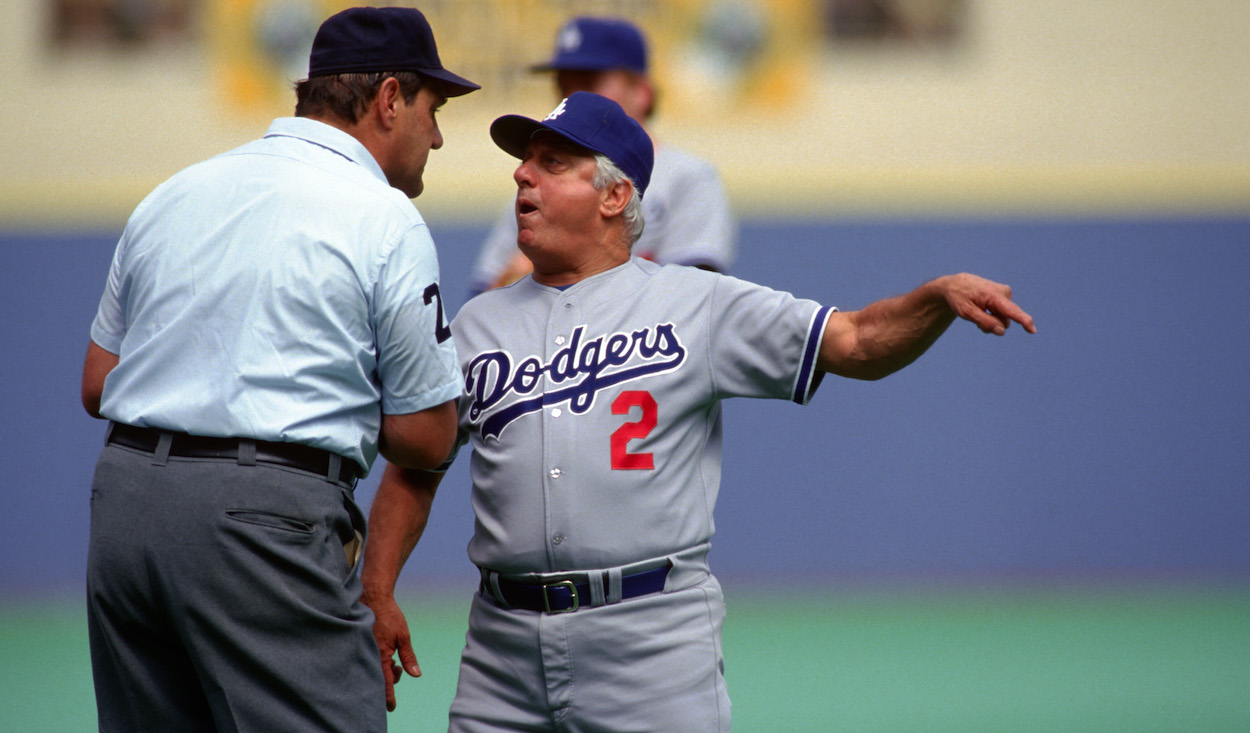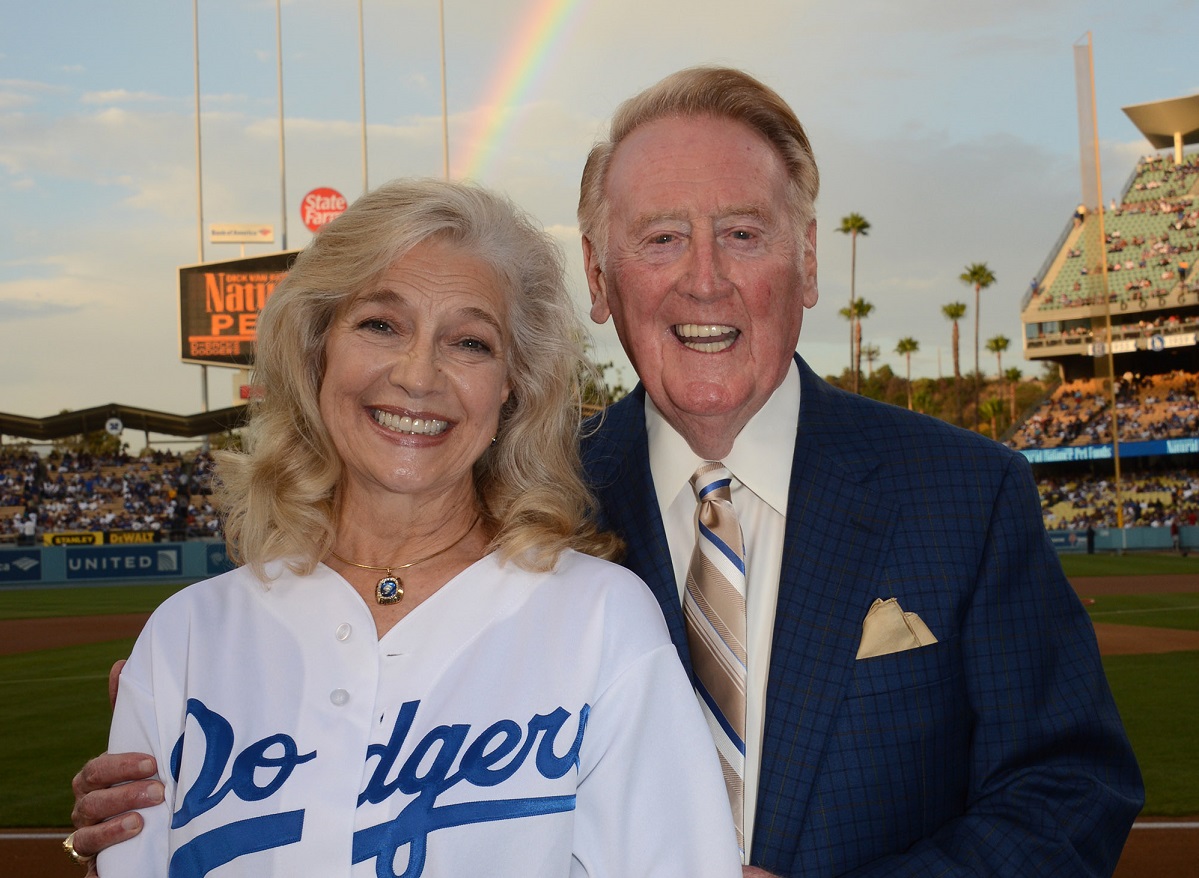Legendary Hall of Fame Dodgers manager Tommy Lasorda, who spent seven decades with the organization in the dugout and as an ambassador for the game, has died at age 93, the team said Friday.
Lasorda had returned home earlier this week after being hospitalized in Southern California for nearly two months. He suffered cardiopulmonary arrest Thursday night at his home, the Dodgers said.
He later died at a hospital.
The Los Angeles Dodgers tweeted Tuesday that their former manager left the hospital and returned to his Fullerton home. He had been hospitalized due to heart issues since Nov. 8, although the team didn’t make it public until a week later.
He underwent several weeks of rehab in the hospital.
His heart was bigger than his talent and there were no foul lines for his enthusiasm.
Vin Scully
The former manager, one of baseball's biggest personalities, most recently served as advisor to the Dodgers during his 71 years of service to the storied franchise. He managed the Dodgers from 1976-96.
Hall of Fame announcer Vin Scully witnessed Lasorda's career and recalled his seemingly limitless enthusiasm for baseball and the Dodgers.
“There are two things about Tommy I will always remember,” Scully said. “The first is his boundless enthusiasm. Tommy would get up in the morning full of beans and maintain that as long as he was with anybody else.
“The other was his determination. He was a fellow with limited ability and he pushed himself to be a very good Triple-A pitcher. He never quite had that something extra that makes a major leaguer, but it wasn’t because he didn’t try. Those are some of the things: his competitive spirit, his determination, and above all, this boundless energy and self-belief. His heart was bigger than his talent and there were no foul lines for his enthusiasm.”
A Hall of Famer inductee in 1997, Lasorda led the Dodgers to two World Series championships and two World Series losses during his 20-year managerial career. he fulfilled a dream of seeing the Dodgers win another title in 2020.
"In a franchise that has celebrated such great legends of the game, no one who wore the uniform embodied the Dodger spirit as much as Tommy Lasorda," Stan Kasten, team president/CEO, added. "A tireless spokesman for baseball, his dedication to the sport and the team he loved was unmatched. He was a champion who at critical moments seemingly willed his teams to victory. The Dodgers and their fans will miss him terribly. Tommy is quite simply irreplaceable and unforgettable.''
Born in Norristown, Pennsylvania, the Fullerton resident was with the Dodgers organization for 71 years as a player, scout, manager and front office executive.
"My family, my partners and I were blessed to have spent a lot of time with Tommy,'' Mark Walter, Dodgers owner/chairman, said. "He was a great ambassador for the team and baseball and a mentor to players and coaches. He
always had time for an autograph and a story for his many fans and he was a good friend. he will be dearly missed.''
Lasorda was originally signed by the Philadelphia Phillies in 1945, before reaching the big leagues as a pitcher with the Brooklyn Dodgers in 1954.
Lasorda struggled to stick in the major leagues as a pitcher. He was sold to the Kansas City Athletics in 1956, traded to the New York Yankees and then sold back to the Dodgers in 1957. But he played more for the Montreal Royals of the International League, a Dodgers' minor league affiliate. He was once sent down to Montreal after the Dodgers were forced to keep a young Sandy Koufax on their roster due to the Bonus Rule. He later joked that it took Koufax -- a Hall of Famer and one the greatest pitchers in baseball history -- to keep him off the Dodger pitching staff.
In Memoriam: People We've Lost in 2021
After his playing career ended in 1960, Lasorda spent the next decade working his way up through the Dodgers organization as a scout and minor league manager. In 1973 he was made the team's third-base coach and heir-apparent to longtime manager Walter Alston, finally taking over when Alston retired at the end of the 1976 season after Alston had managed the team for 23 seasons.
In his early years managing the team, the gregarious Lasorda was often known as much for his celebrity connections, bringing famous pals such as Frank Sinatra and Don Rickles and fellow Italian-American notables such as Tony Danza into the clubhouse after games. His Hollywood ways led some to dismiss his managerial abilities, but Lasorda would eventually win them over with sheer endurance and two world championships.
"Tommy Lasorda was one of the finest managers our game has ever known,'' Major League Baseball Commissioner Rob Manfred said. "He loved life as a Dodger. His career began as a pitcher in 1949 but he is, of course, best known as the manager of two World Series champions and four pennant-winning clubs. His passion, success, charisma and sense of humor turned him into an international celebrity, a stature that he used to grow our sport.
"Tommy welcomed Dodger players from Mexico, the Dominican Republic,
Japan, South Korea and elsewhere -- making baseball a stronger, more diverse
and better game,. He served Major League Baseball as the Global Ambassador for the first two editions of the World Baseball Classic and managed Team USA to gold in the 2000 Summer Olympics in Sydney. Tommy loved family, the United States, the National Pastime and the Dodgers, and he made them all proud during a memorable baseball life.''
His outgoing personality had a bit of a salty side, notoriously captured in a furious 1978 tirade after a reporter asked for his opinion of Dave Kingman's performance after the Cubs outfielder had hit three home runs against the Dodgers. Lasorda cursed a blue streak, and bootleg versions of the tape made the rounds for years, taking some of the luster off his image for some, but endearing him to other fans even more.
Lasorda took over a talented young team led by the infield of Steve Garvey at first, Davey Lopes at second, shortstop Bill Russell and third-baseman Ron Cey. They made it to the World Series in 1977 and 1978, losing two frustrating six-game series to the New York Yankees. Slugger Reggie Jackson memorably hit three home runs in the Yankees' 1977 title-clinching Game 6 victory at Yankee Stadium. The following year, the Dodgers won the first two games before losing four straight.
When the Dodgers finally made it over the hump in 1981, they did so in dramatic style. Major League Baseball added an extra round to the playoffs that year due to a players strike. In the division series, the Dodgers lost the first two games of a best-of-five series to the Houston Astros before storming back to win three straight.
The National League Championship Series offered more drama, with the Dodgers falling behind the Montreal Expos two games to one, and needing to win the final two games in Canada. After a blowout win in Game 4, the Dodgers won the deciding fifth game on a ninth-inning home run by Rick Monday, setting the stage for a rematch with Jackson and the Yankees in the 1981 World Series.
This time L.A. flipped the script from 1978, losing the first two game at Yankee Stadium and returning home with most believing the pinstripes simply had their number. The subsequent three games at Dodger Stadium constituted one of the most memorable baseball weekends in Los Angeles history.
Led by rookie pitcher Fernando Valenzuela, L.A. won Game 3, 5-4, on a Friday night. Game 4 was played the next day and was a raucous, see-saw affair, with the Dodgers coming back from a 6-3 deficit to win, 8-7 thanks in part to a two-run, pinch-hit homer by Jay Johnstone. The Dodgers faced Yankees ace Ron Guidry in Sunday's pivotal Game 5 and trailed, 1-0, in the seventh inning when Pedro Guerrero woke up the crowd by sending a Guidry slider into the left-field seats to tie the game. The next batter, catcher Steve Yeager, did likewise and LA had to 2-1 victory and a 3-2 series lead.
Three nights later, Lasorda and the Dodgers vanquished their nemesis in the Big Apple for their long-awaited world championship, pounding the Yankees for 13 hits in a 9-2 victory.



